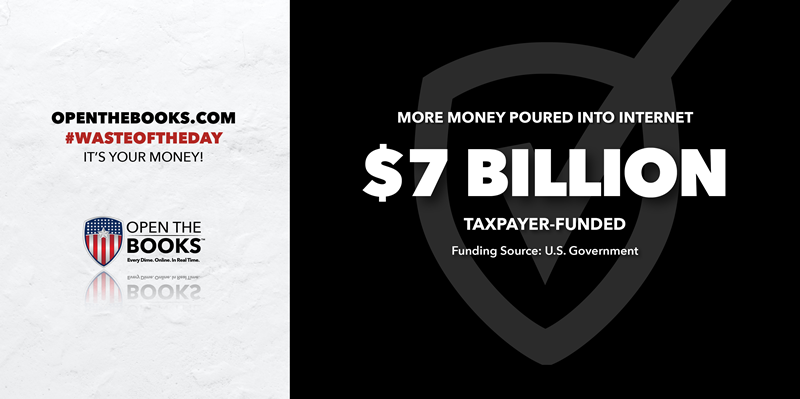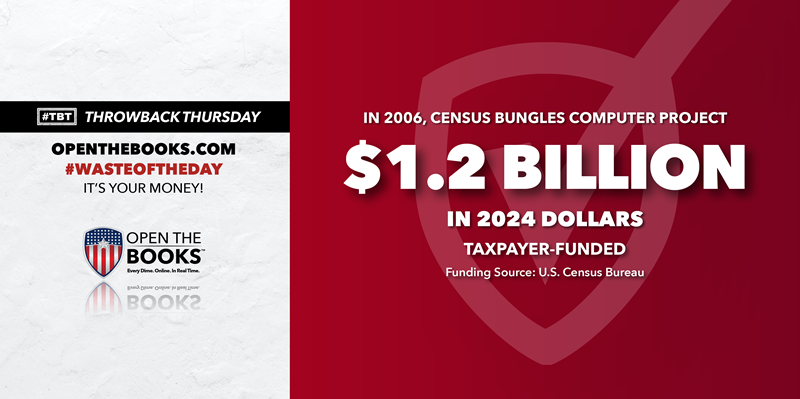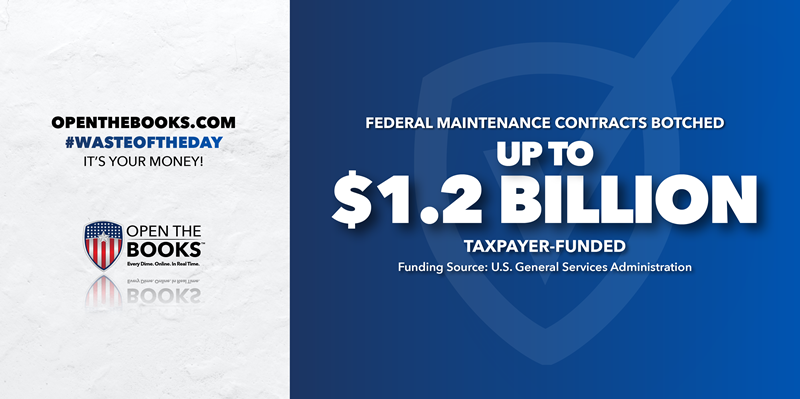
New Houston Mayor Declares His City “Broke”
May 27, 2024

Topline: Former Houston Mayor Sylvester Turner claimed his city had a $420 million surplus before leaving office in December.
That’s not the case. In reality, the city is completely “broke” with a deficit of $160 million, according to Mayor John Whitmire.
Key facts: The Greater Houston Partnership called Turner’s dollar figure a “budgetary sleight of hand” because it did not include many of the huge liabilities on the city’s books.
Turner ignored $3 billion in deferred maintenance on roads, $3 billion in upcoming costs for water infrastructure and more, according to the Partnership.
The city has avoided problems thus far by using $1 billion in federal COVID relief funds, but those will soon run dry.
The think tank Truth in Accounting gave Houston a letter grade of “D” in its annual “State of the Cities” report and estimated that it would take $9,000 from each taxpayer to pay off the city’s debt.
City Controller Chris Hollins said the city will likely ask voters to fund a bond in November to cover the deficit.
Whitmire proposed a 5% budget cut to all city agencies except the police and fire department.
Houston is already struggling to pay its current expenses. The city recently agreed to give its firefighters $650 million in backpay because they’ve been working without a contract for seven years and made less than their peers in other large Texas cities.
To pay for it, Houston is selling taxpayers a bond that won’t be paid off for 25 to 30 years and will be worth over $1 billion with interest.
Background: Houston’s situation might improve if it could cut down its $1.6 billion payroll.
For example, Houston paid out salaries of nearly $400,000 each to 12 different doctors last year, according to OpenTheBooks.com.
Mayor Turner made $236,000 — a hefty salary, and one of the largest in the country – even for a big city mayor.
Critical quote: Chuck Mahron, founder of the urban planning group Strong Towns, said Houston’s financial issues run too deep to be solved by simply raising taxes.
“Houston is the North American growth pattern on steroids, right; it is kind of the poster child of horizontal expansion – Houston has just outgrown itself,” Marohn told Texas Standard.
“It has built more roads, more pipes, more sidewalks, more infrastructure, more drainage areas, more parks than its tax base has the capacity to sustain … The things that Houston has done to generate growth and prosperity has actually made it insolvent. And that is the core problem they’re dealing with.”
Summary: It’s bad enough that major cities in America are millions of dollars in debt. It’s even worse when officials hide that fact from taxpayers.
Congressman from PA Gets Grant for Solar Panels
May 28, 2024

Topline: Taxpayers are asking Rep. Mike Kelly (R-PA) to put his money where his mouth is — or rather, give back the money.
Kelly’s family-owned car dealership recently received a $315,000 grant to build solar panels through President Joe Biden’s Inflation Reduction Act, even though Kelly said the law was “loaded with bad policy and wasteful spending.”
Key facts: The Mike Kelly Automotive Group in Uniontown, Penn. will use the grant from the Department of Agriculture to build enough solar panels to power the equivalent of 25 homes, according to the Erie Times-News. It will save the company $27,300 a year.
The funds are part of over $1 billion being distributed from the Rural Energy for America Program, which not a single House Republican supported.
Kelly’s car dealership also took a $1 million forgivable loan from the Paycheck Protection Program during the pandemic. Kelly later voted against a law that made the loan recipients’ names public.
The White House reminded Kelly of that fact on social media when he criticized Biden’s plan to forgive student debt.
Critical quote: Preston Nouri, the Democratic candidate running against Kelly, said Kelly’s family should return the grant.
"For over 13 years, he keeps getting caught with his hand in the cookie jar, taking taxpayer money to enrich himself while working against the interests of the people he’s supposed to represent,” Nouri said in a statement.
Supporting quote: “Representative Kelly’s energy policy has always supported an all-of-the-above approach,” Matt Knoedler, a Kelly spokesperson, told the Erie Times-News. “Additionally, Rep. Kelly does not have an active role in the day-to-day operations of his family’s business.”
Summary: Kelly referred to global warming as “so-called climate change” in his opposition to Biden’s legislation. Suddenly, he supports clean energy once it financially benefits his company.
Congress Wants to Extend Covid-Era Internet Subsidies
May 29, 2024

Topline: The U.S. government spent $17.2 billion to give “emergency” internet service to 23 million people during the pandemic. The lockdowns are long over, but Congress still wants to invest another $7 billion into the plan.
Key facts: The Affordable Connectivity Program started paying $30 monthly subsidies to 23 million families at the start of 2022 at a cost of $14 billion, following a similar one-year program that cost taxpayers $3.2 billion.
One-fifth of Americans currently qualify for the subsidies.
The Wall Street Journal dubbed it the “Free Netflix Plan” and suggested that it actually increased internet prices because customers have less incentive to try and find the cheapest rate.
Full subsidies ended this April, but a bipartisan group of 230 House members has sponsored a bill that would pour even more money into the program.
That may be a needless expense. The Journal reports that many internet providers don’t expect to lose subscribers even if the subsidies run out because their customers will still be able to afford service.
A recent Federal Communications Commission survey is lacking in transparency about how many Americans actually require internet subsidies.
The FCC’s fact sheet boasts that 77% of subscribers say their internet service would be “disrupted” if the Affordable Connectivity Program ends. But reviewing the survey in more detail reveals that only 16% of subscribers say they’d be completely unable to afford internet service.
The Wall Street Journal also reported that over $3 billion of the federal funds went to just one company, Charter Communications. T-Mobile received the next most with $1.05 billion.
Background: In addition to the subsidies, the 2021 infrastructure law gave broadband providers $42.5 billion in federal money to improve their service and lower their prices to $30 a month — a price point that allowed the Affordable Connectivity Program to provide free internet.
It’s all part of the $90 billion that Congress allocated for President Joe Biden’s “Internet for All” plan, which spans 11 programs across four federal agencies.
These programs have gotten more expensive over time. Previous reporting from OpenTheBooks.com revealed that one initiative to provide internet to rural areas spent $4,700 per household in 2019 but jumped to $18,000 per household in 2023. The price increase meant only half as many families actually benefited from the program.
Summary: The federal government should focus on providing internet to those who absolutely can’t afford it, not those trying to binge their favorite TV show.
Waste of the Day: Throwback Thursday: Census Bureau Reinvents Paper and Pencil
May 30, 2024

Throwback Thursday!
Topline: The 2020 U.S. Census was the first to be conducted online, but not for a lack of trying — $810 million worth of trying, to be exact.
The Census Bureau spent five years trying to invent computers to use in the 2010 Census but ended up using paper and pencil once the project fell through.
That’s according to the “Wastebook” reporting published by the late U.S. Senator Dr. Tom Coburn. For years, these reports shined a white-hot spotlight on federal frauds and taxpayer abuses.
Coburn, the legendary U.S. Senator from Oklahoma, earned the nickname "Dr. No" by stopping thousands of pork-barrel projects using the Senate rules. Projects that he couldn't stop, Coburn included in his oversight reports.
Coburn's Wastebook 2008 included 65 examples of outrageous spending, including the $810 million wasted preparing for the 2010 U.S. Census. The money would be worth $1.2 billion today.
Key facts: The Census Bureau awarded a $600 million contract to the Florida-based Harris Corporation in 2006 to invent handheld computers so census workers could take data electronically. It was meant to save money in the long run.
Coburn asked Census Director Louis Kincannon at a 2006 Senate hearing what would happen if the computers didn’t work.
He replied, “They will work. They have worked. You might as well ask me what happens if the Postal Service refuses to deliver the census form.”
Kincannon was wrong.
The Government Accountability Office later reported that the computers were over budget, behind schedule and were not properly tested. In 2008, Congress asked the Census Bureau to go back to using paper and pencil, even though the Harris Corporation contract had already been paid.
The decision forced Congress to transfer an emergency $210 million into the Census Bureau to help cover a shortfall in the cost of completing the census.
Critical quote: Congress and the Harris Corporation both laid most of the blame for the mishap on the Census Bureau.
Harris Corporation Vice President Cheryl Janey told the House Oversight Committee in 2008 that "It was just this past January, two years after the contract was first issued, that we received more than 400 new and altered contract modifications.”
Summary: If the Census Bureau is able to count every person living in the U.S., they should have no trouble counting all the money they wasted in the 2000s.
Contractors Left Mold, Leaky Pipes in Public Buildings
May 31, 2024

Topline: The General Services Administration spent $1.2 billion last year on 340 contracts for maintenance in public buildings around the country, but a recent inspector general report says companies are not “complying with the terms” of those contracts.
Key facts: Auditors inspected six GSA buildings whose maintenance contracts cost a total of $184 million. They found that 69% of work orders in the buildings were not completed properly, even though employees marked them as finished. Heating systems, emergency generators and more were left unfixed for nearly a year.
Urgent work orders are required to be completed within 24 hours, but only 6% actually were, the IG report found.
At the Edith Green-Wendell Wyatt Federal Building in Portland, Or., where the GSA spends $2.2 million for maintenance, staffers were sent to fix a fire system water tank. The work order was marked as complete for at least nine months even though the tank still had cracks in it, risking failure of the building’s sprinkler system.
The GSA spends $24.2 million for upkeep at Georgia’s San Nunn Atlanta Federal Center, where cooling systems are required to be cleaned every three months. Employees independently decided to clean the systems less often and cancelled work orders requesting repairs. Auditors found mold and fungus growing in the cooling systems, increasing the risk of disease.
Maintenance at the Jacob K. Javits Federal Building in New York City costs $97 million. Employees claimed to have fixed a leaky pipe dripping directly onto the building’s central electrical equipment in November 2022, but auditors found the pipe still leaking in January 2023, the IG found.
Contractors are supposed to review their own performance monthly, but auditors found buildings that had not submitted reports in 15 months.
Auditors blamed both the GSA and the private contractors for the issues. They said the GSA “does not always provide effective oversight” of building maintenance, and the contractors are not dedicating enough staff towards completing work orders.
Background: The Government Accountability Office reported in March that 638 GSA buildings are not meeting required deadlines for asbestos inspections.
But rather than fix their damaged infrastructure, the GSA has been spending money on items like luxury furniture.
OpenTheBooks previously reported that the GSA spent $308 million on furniture during the pandemic, even though nearly all employees were working from home.
The research helped inspire a House Oversight Committee hearing where lawmakers grilled GSA Administrator Robin Carnahan over the agency’s wasteful spending.
Summary: It shouldn’t take a federal audit to see that water is still dripping from a leaky pipe. Some government mishaps require only plain common sense to expose.
The #WasteOfTheDay is presented by the forensic auditors at OpenTheBooks.com.